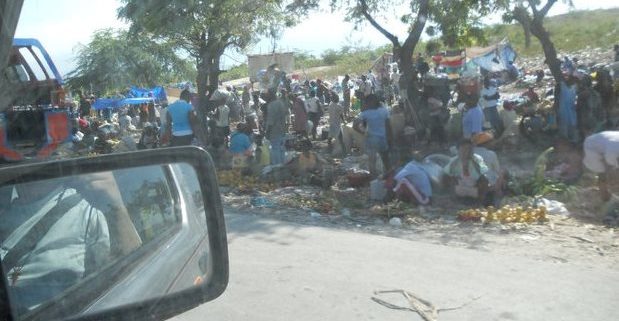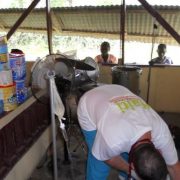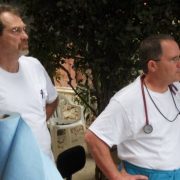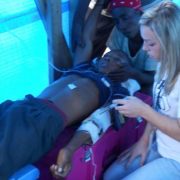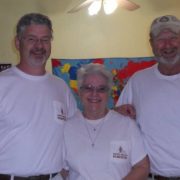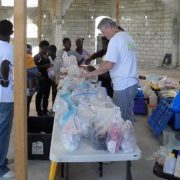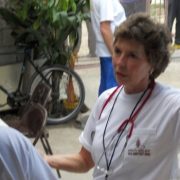Eleven Days in Haiti: Part 4 – Permanent Disaster?
his is part 4 of the “Eleven Days in Haiti” series that started here: https://fbcbridgeport.org/eleven-days-haiti-part-1-series-intro. Be sure to get caught up if you missed the prior post!
DAY 2-PERMANENT DISASTER?
I had an interesting conversation with Dan last night at bedtime. I thought about Day 1’s work and wondered, based on that, if we would be seeing the same people and treating the same illnesses had January’s earthquake never happened. We had seen very little that would be considered medical disaster relief. Oh yeah, the quake worsened many existing problems, such as lack of sanitation, poor diet and lack of infrastructure and services. But these problems were here before. The lack of progress and recovery leads to the tough questions. When does this mission end? If “disaster relief” ends, and the relief organizations pull out for the next disaster, how does Haiti care for its ailing population and provide basic services and infrastructure? By continuing to care for Haiti’s poor, are we creating a dependency problem? How far away from this is any nation?
2:30 PM
I don’t know what the temperature is today, but the word ’perfect’ comes to mind. I’m sitting on my bunk on the screened porch where the men sleep overlooking the bay that swallows up the sun every evening by 6:00pm. The cool breeze that ruffles the surrounding palm trees is also—well—perfect.
Last night we were just too tired to pack meds into the “units-of-use” and thought we could just package as we go, but we were lucky it was a light day. Pre-packaging saves time so we’ll be counting pills tonight. Who knows what tomorrow brings.
I rode to clinic today with Dr. Vlad. Just the two of us in the front of the truck. He is an amazing man. He went to med school in Haiti, but did a residency in Indiana, then returned to Haiti. He is now a US citizen, so every six months, he must return to the US. He was due to return in January 2010 when the earthquake struck and he just couldn’t leave. It was logistically impossible, but the needs of his people were just too great for him not to stay and render aid. During the week of the quake, some of his friends from Indiana were visiting Haiti. They were staying in a seriously stricken area, just southeast of Port-au-Prince. The house they were in started to shake, so they ran outside while the house crumbled around them. Two Haitians stayed inside and perished. Vlad, of course, knew where his friends were supposed to be, but they were forced to live on the streets for the 4 days it took Vlad to find them. I don’t know Vlad well, but from the change in his tone and facial expression, I know it was emotionally difficult for him to tell that story. Vlad finally felt compelled to return to the states in September, 2010, fully eight months past his required return. His apprehension was likely evident as he approached the immigration agent in Miami. When asked how long he had been in Haiti, I’m sure Vlad’s calm demeanor was challenged, but I can hear him quietly relating his story of service to his people in a time of great catastrophe. The agent didn’t hesitate, but handed Vlad his passport, said “Thank you for what you did” and motioned him past.
Vlad lives in one of the one of the Samaritan’s Purse tarp shelters just outside the Global Outreach compound. And his medical director’s position with NCBM pays him $75 per week.
He is a hero, but it is doubtful anyone will know his story.
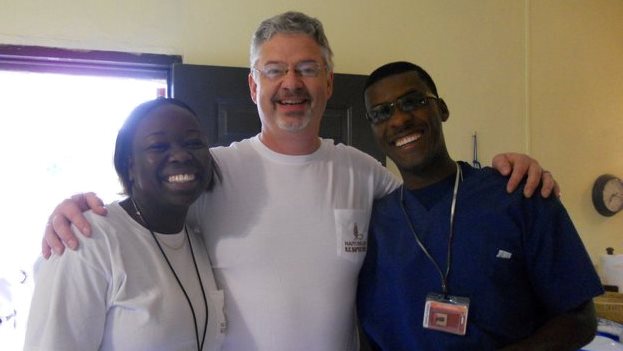
He is so willing to share history, customs and his experiences of Haiti. He shared today that every January 1, all Haitians, wherever they are in the world celebrate the independence of their nation by eating pumpkin soup. This common food was denied to the Haitians under harsh French rule, so they commemorate their freedom by re-instating this custom.
Today was market day, which is best described as a flea market in US terms, although it serves a much higher purpose of supplying certain vital food items to local residents.
Vendors set up in tents or booths along the road selling food, personal items, electronics and many sundry items. This all sounds quaint, but in truth it is noisy and filthy. I’ve never heard anyone say “It’s garbage night” but I did see trucks in the city with crews picking up bagged trash along the streets. They are way behind in this task as garbage, bagged and otherwise, is piled everywhere. [I discovered later that the garbage on our compound is collected and burned daily.]
I enjoyed my first Coke this afternoon since last week, but what I miss here is milk. There is some powdered milk available but it didn’t taste good to me.
It has been interesting watching Dan work without all the technology and staff he is accustomed to at home. The term “practical compassion” comes to mind if that makes sense.
We took Jenna with the medical team today, as we thought this would be a good opportunity for her to observe the way medicine and pharmacy are practiced in Haiti. We also felt this was a safer environment for her since the construction team would be working at the local police station. There is a possibility of some unrest, especially in Port-au-Prince due to the release of national election results.

